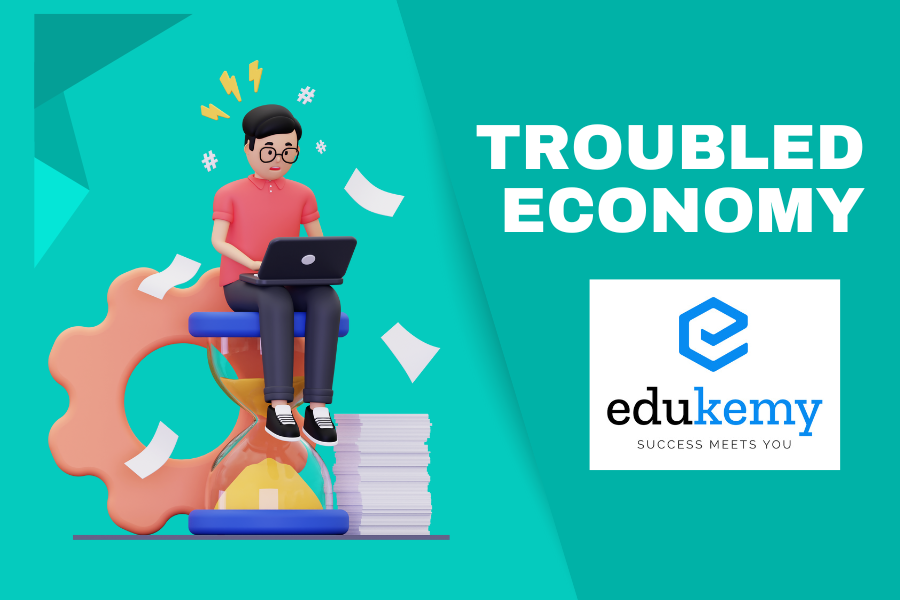
In the wake of unprecedented global challenges, the specter of a troubled economy looms large, casting a shadow of uncertainty over both developed and developing nations alike. Economic woes, whether sparked by geopolitical tensions, natural disasters, or pandemics, have the potential to reverberate across industries, impacting livelihoods and eroding confidence in financial systems. As governments and financial institutions grapple with the intricate web of economic intricacies, the resilience of economies is put to the test, prompting urgent calls for innovative solutions and prudent fiscal policies. In such turbulent times, understanding the multifaceted nature of a troubled economy becomes imperative, as societies navigate the complexities of recovery and strive towards a more stable and prosperous future.
The economic challenges faced by India during the early 1990s were multifaceted and severe:
- Fiscal Imbalances and Debt Burden:
- The economic crisis stemmed from significant fiscal imbalances that had accumulated over the 1980s. Previous governments, including those led by the Congress party, had taken substantial loans from world financial institutions and the market, resulting in a substantial debt burden.
- Foreign Exchange Crisis:
- India’s foreign exchange reserves had dwindled to dangerously low levels. The country struggled to finance essential imports, particularly oil and fertilizers, and to repay its official debt. The situation worsened due to the Gulf War, which led to a spike in oil prices.
- IMF Loans and Economic Reforms:
- The Chandra Shekhar government, under the leadership of Finance Minister Yashwant Sinha, sought assistance from the International Monetary Fund (IMF) and secured approval for two loans by January 1991. In return, the government committed to initiating economic reforms through the upcoming budget.
- Political Instability and Budget Crisis:
- However, political turmoil ensued when the Congress party withdrew its support from the government during the budget session in February 1991. This move prevented the minority government from presenting the full budget, exacerbating the economic uncertainty.
- Gold Pledging and Liquidity Crisis:
- To manage the foreign exchange crisis, the government pledged the country’s gold reserves in March 1991. Despite public outcry and criticism, this decision was deemed necessary to avert a default in sovereign payments and alleviate the severe liquidity crisis.
- Transition to New Government:
- With Chandra Shekhar’s resignation in March 1991, fresh elections were announced, and the Lok Sabha was dissolved. Chandra Shekhar continued as caretaker Prime Minister until June, facilitating the transition to a new government.
Overall, the economic challenges of the early 1990s necessitated urgent and decisive action, setting the stage for subsequent economic reforms initiated by the new government.
Contents
- 1 FAQs
- 1.1 Q: What causes an economy to be troubled?
- 1.2 Q: How does a troubled economy affect individuals?
- 1.3 Q: What measures can be taken to address a troubled economy?
- 1.4 Q: How long does it take for an economy to recover from a troubled state?
- 1.5 Q: What are the long-term consequences of a troubled economy?
- 2 In case you still have your doubts, contact us on 9811333901.
FAQs
Q: What causes an economy to be troubled?
A: Economic troubles can arise due to various factors, including recessions, high unemployment rates, inflation, deflation, fiscal mismanagement, geopolitical tensions, natural disasters, and pandemics. These factors can disrupt economic activities, leading to uncertainty and instability.
Q: How does a troubled economy affect individuals?
A: A troubled economy can have widespread impacts on individuals, including job losses, reduced wages, diminished purchasing power, increased financial stress, limited access to credit, and decreased investment returns. It can also exacerbate socio-economic inequalities and lead to a decline in overall living standards.
Q: What measures can be taken to address a troubled economy?
A: Governments and central banks typically employ various fiscal and monetary policies to mitigate economic troubles. These measures may include stimulus packages, tax cuts, increased government spending on infrastructure and social programs, lowering interest rates, quantitative easing, and regulatory reforms to stimulate economic growth and stability.
Q: How long does it take for an economy to recover from a troubled state?
A: The duration of economic recovery depends on the severity of the crisis, the effectiveness of policy responses, and external factors. Recoveries can vary significantly in length, ranging from months to years. Structural reforms, innovation, and international cooperation can expedite the recovery process.
Q: What are the long-term consequences of a troubled economy?
A: Persistent economic troubles can result in lasting consequences, such as lower productivity, reduced innovation, increased poverty, social unrest, political instability, and weakened global competitiveness. Addressing underlying structural issues and fostering sustainable economic growth are essential for mitigating long-term repercussions.
In case you still have your doubts, contact us on 9811333901.
For UPSC Prelims Resources, Click here
For Daily Updates and Study Material:
Join our Telegram Channel – Edukemy for IAS
- 1. Learn through Videos – here
- 2. Be Exam Ready by Practicing Daily MCQs – here
- 3. Daily Newsletter – Get all your Current Affairs Covered – here
- 4. Mains Answer Writing Practice – here

